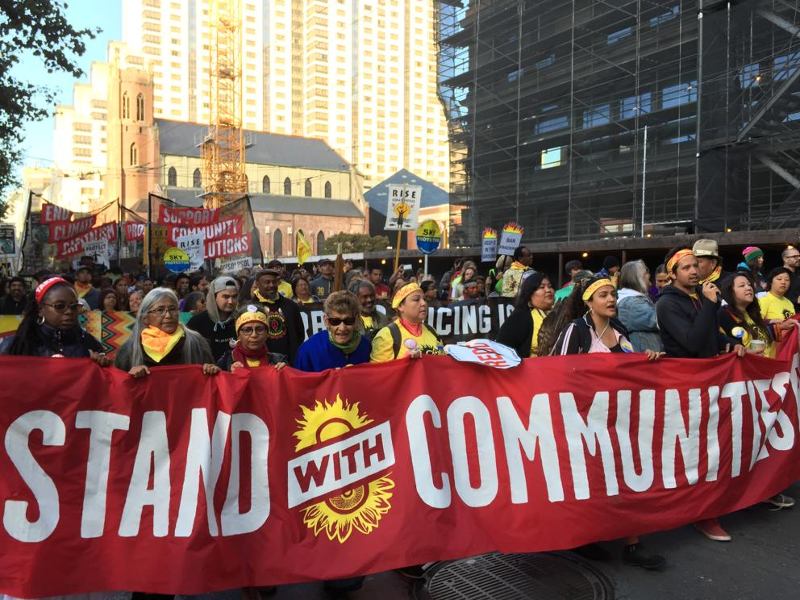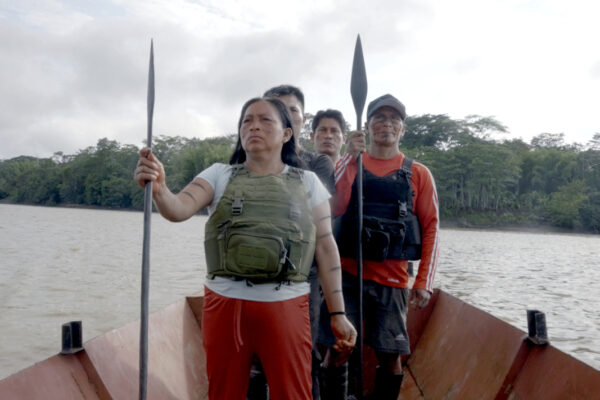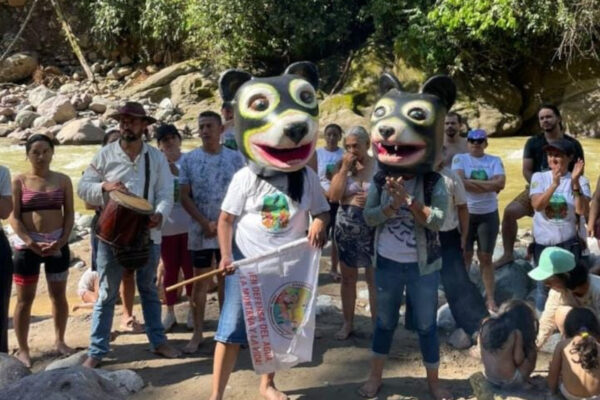“The planet depends on us. The Earth, the rivers, the mountains, the trees provide us with oxygen, and we need to ensure that we protect them. We need to listen to each other’s voices. We need to understand that climate change doesn’t just affect indigenous people – it affects all of us. We must have the will to change. We’re committing suicide in this moment.”Mirian Cisneros, President of Sarayaku
As Hurricane Florence bore down on the Carolinas and super Typhoon Mangkhut devastated the Philippines and parts of China, the streets of San Francisco were also flooded last week by tens of thousands of people demanding greater, more urgent action to address the global climate crisis.
Led by the native Coastal Miwok and Ohlone peoples of the Bay Area and indigenous peoples from around the world, over 30,000 demonstrators filled Market Street in the largest West Coast mobilization for climate justice ever. The “Rise for Climate, Jobs, and Justice” march in San Francisco was one of over 900 actions in 95 countries calling on governments and institutions to leave fossil fuels in the ground and commit to 100% renewable energy.
Amazon Watch was there and proud to have accompanied a delegation of Kichwa indigenous peoples from Sarayaku. They made the long journey from deep inside the Ecuadorian Amazon to share their solution to the climate crisis, their Kawsak Sacha, or Living Forest Proposal, which they publicly launched in Ecuador this summer. This visionary proposal would create a new international category for the permanent protection of native land, free of natural resource extraction and based upon the interconnected relationship between indigenous peoples and all the living beings within their their forests and waters.
This global day of action kicked off a week of events surrounding the Global Climate Action Summit (GCAS) hosted by California Governor Jerry Brown, which urged national governments and civil society to step up climate action. Governor Brown organized the GCAS to cement his legacy as the environmental governor before he leaves office this fall and push back against the Trump Administration’s climate denial, evisceration of environmental agencies, laws, and safeguards, and move to withdraw from the Paris Climate Agreement.
Much like the UNFCCC Conference of Parties (COP) events, the summit was dominated by politicians, businesses, big non-profit organizations, and others promoting market-based, business-friendly mechanisms and technological fixes.
As a result, left off the agenda was talk of policies that address one of the root causes of climate change: fossil fuel extraction. Also left out were many of the indigenous peoples and communities in California and globally most affected by fossil fuels and the impacts of climate change.
The voices of local communities whose territories would be directly impacted by forest offset programs were also largely absent from the conversation inside of GCAS – whether their communities would be impacted through the implementation of these offset programs without their consent or whether the continued pollution of their neighborhoods would be “offset” through forest protection thousands of miles away.
In response, communities took to the streets and their message of no more oil and gas drilling and no offsets was heard loud and clear, and Amazon Watch worked hard to amplify the voices of indigenous peoples from the Amazon. Hundreds of people rallied outside the Monday meeting of the Governor’s Climate and Forests Task Force (GCF) to reject carbon offset programs like REDD (Reducing Emissions from Deforestation and Forest Degradation) under consideration by the Task Force. This is one reason leaders from the Kichwa community of Sarayaku in Ecuador’s Amazon made the long journey to San Francisco: the governor of their province was inside of the GCF promoting a proposed territorial protection program that had been crafted without the proper consultation of the indigenous peoples across the province.
“The governors, certainly in the case of Ecuador, have to consult with the legitimate owners of the land – with us, the indigenous communities – before coming to any kind of agreement among themselves about the uses of our lands and forests,” Marlon Santi of Sarayaku told the Pacific Standard. “We do not agree with the way they have come here to reach agreements among themselves without consulting with us.”
“We are here because 2.5 million acres of our forests are being negotiated behind our backs. Our forests are not just carbon,” continued Santi. “Allowing oil companies to continue to pollute while using the forests we have protected for millennia as carbon sinks without our consent is not a climate solution.”
Under pressure, the GCF officials were forced to address indigenous leaders and the crowd organized by Idle No More SF Bay and Diablo Rising Tide and allow a delegation of representatives inside the meeting. The delegation delivered a hard-hitting letter demanding greater respect for indigenous peoples’ sovereignty and self-determination.
Days later, at the official opening of the summit, hundreds blocked delegates from entering, calling for those entering to stand with communities not corporations. Many directed their complaints at California Governor Jerry Brown. Despite being the conference host and claiming the climate hero mantle, he has approved over 20,000 new oil permits during his tenure, and he also has allowed refineries to continue to expand and purchase large quantities of dirty crude oil from the Amazon.
The interconnectedness of the oil and gas industry hit home for Sarayaku leaders when they visited the Chevron refinery in Richmond and heard about the explosion that sent 15,000 people to the hospital in 2012. As Mirian Cisneros, the President of Sarayaku explained, “the crude that contaminates our communities in the Amazon is the same crude that is coming here and poisoning the people of Richmond.”
While chants filled the streets outside, a brave few spoke truth to power on the inside. Nina Gualinga, also from Sarayaku, dared to say what no one else would from behind the podium. “The only way to cease climate change is by keeping fossil fuels in the ground and protecting forests,” she declared. “That means supporting and listening to indigenous peoples who have been living in these forests and protecting them for time immemorial. Anything else is a false solution.”
Amazon Watch is honored to have accompanied Sarayaku leaders throughout the week to ensure their messages and Living Forest proposal was heard on the streets and inside the official meetings. Thank you to all who supported our joint efforts, including the Institute for International Education, Indigenous Environmental Network, Rainforest Action Network, and many more!




















